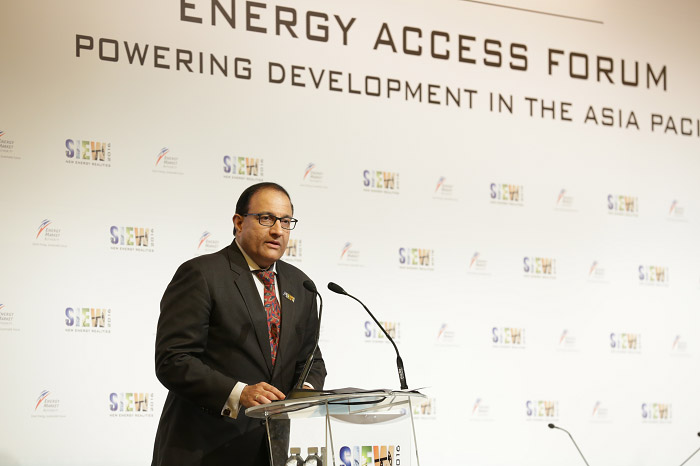
By Rachel Su
Ensuring affordable, sustainable and reliable energy access remains a critical challenge for the Asia Pacific region, Minister for Trade and Industry (Industry) S. Iswaran said on Tuesday at the inaugural Energy Access Forum at SIEW 2016. This forum marks the first collaborative effort with the United Nations Economic and Social Commission for Asia and the Pacific, UNESCAP.
Minister S Iswaran shared that although some progress has been made, more can be done, as around 455 million people in the region still do not have access to electricity. Of these, 130 million are in Southeast Asia.
Asia must also address the rising demand for smart and clean urban energy solutions, resulting from its rapid urbanisation. “To ensure that the region is able to fulfill Asia’s potential economic potential, and promise to its people, the need for secure and reliable energy access has to be addressed in a comprehensive manner”, Iswaran said.
The first area of focus is to develop bankable energy infrastructure projects that ensure that these projects are sustainable in the longer term, Iswaran said. The Asia Pacific region is expected to attract more than US$25 trillion of cumulative investments in generation capacity and grid infrastructure until 2040. He shared that more could be done to profile such projects to investors.
“Our aim is for Singapore to serve as a collaborative platform where energy infrastructure developers, consultants, governments, financial institutions – including Multilateral Development Banks – and institutional investors come together in a vibrant and multi-faceted ecosystem. Working together, we will be able to activate and mobilise the essential expertise, capital, and insights, to help meet the energy needs of the region”, Iswaran said. On this front, IE Singapore has worked with the Asian Development Bank on the Asia Infrastructure Centre of Excellence to help to create bankable infrastructure projects in the region, he added.
Utility companies and Singapore’s research institutions are also driving innovation in related technologies, Iswaran said. ENGIE Lab Singapore, established in July this year is one such company that will serve as an Asia-Pacific Centre of Excellence for low carbon and distributed energy resources. Another such company is Sun Electric, a Singapore-based technology company focusing on urban solar solutions. Nanyang Technological University of Singapore is leading the Renewable Energy Integration Demonstrator-Singapore, REIDS initiative on Semakau Landfill. This project focuses on the challenges of integrating different renewables into a microgrid and these solutions will contribute to energy access solutions in the region.
The last area of focus is garnering international cooperation to unlock energy access options. “International cooperation is critical to promote innovative technological solutions, develop sustainable business models and increase access to financing and investments”, Iswaran said. Singapore is hence working closely with partners to create a platform for interaction and sharing, with the goal of building relationships and exploring business opportunities, he said. On this front, the G20 Energy Ministers are leading the discussions on energy access and have since June this year adopted action plans for the Sub-Saharan Africa and the Asia Pacific region.